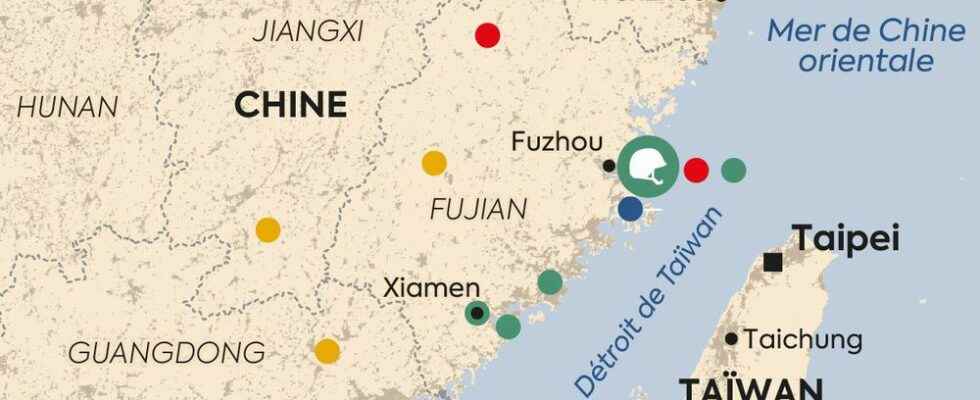In this year of the 20th Congress of the Chinese Communist Party (CCP), announced for the fall, it is better not to have any illusions about Chinese intentions regarding the rebel island. At a time when Vladimir Putin is waging war on Ukraine, there is little chance that Xi Jinping will consider any option other than reintegrating Taiwan into Chinese rule. Paradoxically, Ukraine is an independent state – recognized as such by Beijing since 1992 – and therefore enjoys territorial sovereignty. This is not the case of Taiwan, an inalienable part of Chinese territory according to the communist regime.
In power since 2012, Xi Jinping has continued to toughen his tone against Taiwan and its president Tsai Ing-wen. Taking advantage of the commemoration of the October Revolution of 1911, the Chinese President thus declared: “To achieve the reunification of the fatherland by peaceful means is in the general interest of the Chinese nation. The reunification of our country can be achieved and the will be.” In this case, it is rather the interest of the CCP that is at stake, which puts forward the nationalist card to justify its discourse of a unified China, determined to resume its place as the natural leader of Asia and to push if possible the United States of this part of the Pacific Ocean. As for Putin and his pseudo-tsarist inclinations, the “Chinese national dream” passes through the reconquest of a territory in the name of a so-called historical legitimacy.
When Taiwan wanted to “reconquer the continent”
A former Japanese colony, Taiwan has nevertheless enjoyed de facto autonomy since 1949, following the exile of the former Chinese nationalist leader Chiang Kai-shek, after the victory of the Communists in mainland China. In the 1950s, the “Republic of China” (official name of the regime) even claimed to “take back the continent”.
A few decades later, Taiwan has become a democracy: four presidents elected – and re-elected – by universal suffrage since 1996, a great diversity of political parties… The support of its 24 million inhabitants for the democratic system is real. And the economy, geared towards technology, is dynamic.
Militarily, China enjoys on paper an obvious superiority over Taiwan. The People’s Liberation Army has more than 1 million men, including 416,000 massed in the so-called “Taiwan Strait” region, against 88,000 for the Taiwanese forces; 6300 tanks against 800; 700 combat aircraft against 400. Unlike China, which has two aircraft carriers, Taiwan has none. Beijing also enjoys non-military means of attack, such as cybertechnology.
Infographics
Dario Ingiusto / L’Express
Infographics
Dario Ingiusto / L’Express
However, those who remember the Tiananmen massacre in 1989 know how much the people of Beijing resented the communist regime (in particular the “butcher of Beijing”, Li Peng) for having shed Chinese blood. However, Beijing claims that Taiwan is Chinese, and therefore takes the risk of shocking the very heart of the Chinese population in the event of an attack. Since the war in Ukraine broke out, the population of the island appears more determined than ever to defend themselves. A few months ago, only 40% of Taiwanese said they were ready to fight to defend their territory: this percentage is increased to 70.4%.according to the Taiwan International Strategic Study Society, Similarly, the population seems ready to accept the strengthening of compulsory conscription from four months to one year for men aged 18 to 38.
Ukrainian resilience
Like the rest of the world, the Taiwanese note the resilience of the Ukrainians, their ability to organize themselves using American or European equipment (missile launchers, drones). For five years, the United States has multiplied gestures of support for Tsai Ing-wen: official or semi-official visits, training of the Taiwanese army and supply of armaments. France is not to be outdone: a maintenance contract of 14 million euros was signed at the end of 2021 by MBDA for the equipment of missiles intended for the Mirage delivered to the Taiwanese air force in the 1990s.
Finally, Taipei – like Beijing – may have been surprised by the extent of the economic sanctions imposed on Russia by the United States and the European Union. Rarely have the West – including Germany – had such a harmonized reaction. What would happen to China if it attacked Taiwan?
The warmongers of the Chinese CP
Admittedly, the risk factors have multiplied over the past year against the backdrop of Sino-American strategic rivalry and repeated Chinese air force incursions into the Taiwanese air defense zone, but most experts believe that Beijing, which has always made time management a key decision-making element, will opt to continue with the status quo. If it seems to increase the chances of a strategic rapprochement between China and Russia, the uncertainty linked to the Ukrainian situation will not push Beijing towards unilateral action, which would cause a serious global crisis and plunge the region into a conflict, whose nobody – apart from the warmongers of the Communist Party – wants in Asia. However, it is hard to see Xi Jinping giving up an attack. Because everything suggests that the Taiwan Strait is becoming one of the geopolitical epicenters of the planet.
